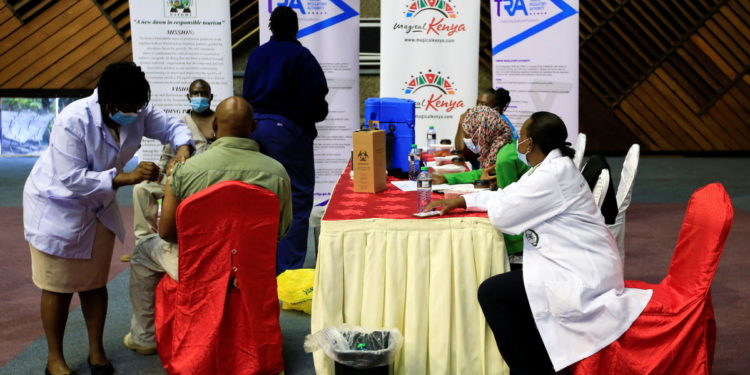The true severity of coronavirus in Africa is likely to be underestimated, in the light of limitations in testing capacity and surveillance as well as uneven demand for testing, according to a new report by the Partnership for Evidence-Based Response to COVID-19, a consortium of global public health organization and private sector firms.
Dubbed “Responding to Coronavirus in Africa: Finding the Balance”, the report, published on Wednesday, said the underestimation has contributed to the dangerous global myth that some African Union member states have not experienced severe hardships due to the pandemic.
The report said even though the number of daily tests across the continent has increased over the course of the pandemic, as of April 13, the test positivity rate remained significantly above the 5 percent maximum recommended by the World Health Organization, and testing strategies have remained variable across member states.
Additionally, it said the test positivity rate was notably high in most member states at the height of the second wave in the continent, indicating many cases were missed.
This was possibly due to a combination of lab capacity constraints and the overall relationship between test availability and willingness to seek a test.
The survey indicated people may not be seeking care for potential coronavirus symptoms.
Among the interviewed people who reported missing health care services, more than 20 percent said they experienced symptoms which may overlap with coronavirus like respiratory problems, fever or chills and fatigue or body pain.
“Underreporting has fueled the dangerous myth that many member states have been unscathed by coronavirus. In reality, they have suffered calamitous health outcomes from coronavirus, in addition to severe economic, social and nutritional distress,” the report said.
The survey researchers are calling for adaptation of testing strategies to the changing local epidemiology, with the help of tools like rapid antigen testing and effective contact tracing.
A similar call was also made by John Nkengasong, the director of Africa CDC, over the weekend as he addressed a virtual joint meeting of AU ministers of health on the situation in the continent.
Nkengasong said while antigen testing kits have been distributed to the 55 member states, only 12 countries are actively using and reporting results.
Most of the African countries are conducting polymerase chain reaction tests, the gold standard, which require laboratories, reagents and experts, limiting coronavirus testing mostly to large cities.
Unlike the polymerase chain reaction tests, where people can wait from 48 hours to more than ten days for results as they are sent for laboratory verification, rapid antigen tests are easy to use, cheaper and provide the results in just 15–30 minutes, enabling countries to decentralize testing, according to the WHO.
Similar to the survey findings, WHO previously estimated a significant number of cases are still being missed in Africa, as most countries are focused on testing travelers, patients or contacts.
The UN agency said rapid antigen testing could enable countries to scale up active case-finding in challenging environments, such as crowded urban neighborhoods and communities in the hinterlands.
According to the Africa CDC data, as of May 6 over 44 million coronavirus tests had been conducted in the continent.
The data further indicated 34 of 55 member states have adequate testing capacity.
Even as vaccines become more widely available, the survey recommends governments continue to monitor coronavirus to balance implementing public health and social measures to keep transmission low while minimizing the socioeconomic disruption.
“Maintaining this balance and targeting communications appropriately will likely encourage adherence to coronavirus prevention measures when they are needed,” the survey said.
“Individual public health and social measures, particularly mask use, will continue to remain critical in the fight against the pandemic, and governments will need to maintain the trust of their communities in order to meet the ongoing challenges that coronavirus will present.”
This figure corresponds to a coverage rate of 1.14 percent at the continental level, with 0.4 percent of the population having received a full vaccine regimen.










